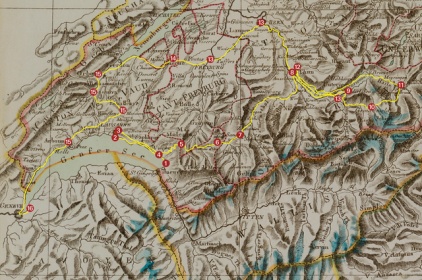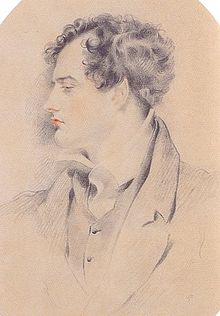
Lord Byron’s Alpine Journal offers a rare unhindered glimpse into the thoughts, emotions of a poet and author whose popularity was partly built on scandal and rumours. It is a work that makes him more relate-able than his other writings, which have redundant melancholic themes of despair and isolation.
One element that emerges is Byron’s response to nature. This allows readers to connect him more readily to other poets of the Romantic era but Matthew Ward posits that Byron’s response to nature is distinctly different than that of Wordsworth (159); in the final entry of the journal Byron says that despite his love of nature, nothing that he has seen or experienced on this journey has eased “the weight upon [his] heart” (159). Ward argues that “with its various comical incidents, its humour and tonal range, the journal testifies to the possibility of play briefly winning out over adversity” (159); he says that Byron benefits not from “Wordsworthian tranquility” but more from being physically active and delighting in moments of frivolous play (159). I disagree with Ward and with Byron; I would argue that being at play is very much a contributing factor to temporarily curing Byron from what he ails, but more so because this play occurs in nature. Had he spent more time in the natural world and engaged in more physically strenuous activity with more regularity, Byron would have found himself at greater peace. Byron notes in his entry dated, September nineteenth, that he laughed when saw their guide fall and tumble down after ascending a steep snowy cliff and that he himself fell while laughing (Levine 287). I admit that although Ward’s argument of Byron improving his mental health through social play has merit, I do not see this as an idea that is entirely divorced from Wordsworthian tranquility.
Byron also mentions that he is pleased and awestruck by certain pastoral and natural elements. He mentions “our Swiss Shepherd’s pipe was sweet” (287), and how much he enjoyed the songs of sweet peasant girls (289-290). He also observes some “excellent waltzing” and admits that he listened to “pretty music” (290). He is struck by the beauty and temperament of local girls who offer him fruit (288) or flowers (290) and row him across lakes (290). Also, Byron finds himself lacking the language with which to properly depict the natural scenery: he says “this was pure and unmixed – solitary – savage and the patriarchal – the effect I cannot describe” (288). He attempts to describe a torrent by saying that it is “nine hundred feet in height,” “like the tail of a white horse streaming in the wind – such as might be conceived would be that of the “pale horse” on which Death is mounted in the Apocalypse,” that “it is neither mist nor water but a something between both” (288). He finally seems to admit the defeat of his words by ending with “wonderful – & indescribable.” These responses to the natural world is further evidence that Byron can and does achieve a peace that is accessed by nature and further refute Ward’s claim discussed above.
Another theme that emerges within the journal is Byron’s dislike for dogs. He notes in the entry dated September eighteenth, that the cottage at Clarens has a dog as hideous as his sister’s own dog, Tip (Levine 287). This reveals a level of raillery that exists between himself and his sister, something with which other sibling groups can connect themselves. In the September twenty-sixth entry, he mentions buying a shepherd dog that is apparently ugly and mean and says that these qualities are precisely what Byron required in the animal to be his carriage watch dog (290). Yet, a few moments later he mentions that his horse is very much like a little dog in manners, but immediately elevates the horse by saying that it is however “a very tame[…] pretty childish quadruped” (290). These sentiments reveal Byron to be funny and redeem him, especially in the eyes of those who see the writer as amoral and monstrous.
Despite the journal ending with Byron recollecting and ruminating over his suffering (Levine 291), it is pleasant to see the poet experience brief moments of joy and good humour and hence modern audiences can look upon him more favourably.
Works Cited
Levine, Alice ed. “From Alpine Journal”. Byron’s Poetry and Prose. New York: W. W. Norton and Company, 2010. 286-291. Print
Ward, Matthew. “Byron at Play in the Alps.” The Keats-Shelley Review 30:2 (2016):155-167. Taylor and Francis Online. Web. 15 Nov, 2016.
Images sourced from:

I like that you identified how Alpine Journal contrasts Byron’s usual melancholia. I cannot deny that one of my favorite features of Byron is his dark way of viewing things, but I agree with you that it puts distance between him and the reader. Further, your identifying his dislike for dogs helps to dismantle the popular notion of Byron-the-suave-depressive-poet, and indeed, makes him more relatable.
Additionally, it was useful that you framed Byron within the context of the Romantic writers, but specified that his work is distinct from Wordsworth’s, despite the Journal’s focus on natural sublimity. The distinction is noteworthy-Wordsworth’s descriptions of nature almost reflect a religiosity at times because of his fervent quality, but in Byron, one feels as though they themselves are experiencing the nature he describes.
It was also interesting that you drew attention to the joking quality of some segments of the Alpine Journal. To me, this is a feature that almost puts the work in a genre of its own – one that combines the awesome sublimity of nature, an at times Wordsworthian depth of description, the essence of a travalogue, and that added flavor of humor that renders the work unique.
I appreciate your thorough exploration of this piece! It definitely gave me some things to think about.
LikeLike
It means so much to me that you liked it Loren. You are so articulate when you express yourself, and your comment is no different. Thank you so much for reading my post, and your meaningful comment.
LikeLike